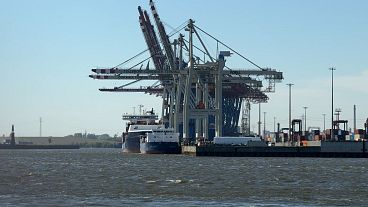The US has already imposed restrictions on Chinese companies such as Huawei, which prevents it from receiving semiconductor chips, as well as telecommunications equipment from US manufacturers.
The China-US artificial intelligence trade war could intensify with speculation that Washington is thinking of tightening the export and sales of key semiconductor chips.
It follows an unconfirmed report that President Joe Biden is considering using a wide-sweeping regulation, the foreign direct product rule, to further restrict sales of critical chipmaking equipment to China, according to Bloomberg.
This can apply even if the product is being manufactured in a foreign country, without any US-origin components, and being sold to third-party buyers without ever coming into the US. As such, the US government can claim that these technologies are subject to the Export Administration Regulations (EAR).
This news has hit shares of several Big Tech companies such as Microsoft, which dropped 1.32% to $443.55 (€405.69) on Wednesday. Apple also fell 2.53% to $228.88 on Wednesday, with Nvidia plunging 6.62% to $117.99.
It's estimated that the world’s biggest companies have lost more than $338 billion of value due to these trade war fears.
What has led to the China-US artificial intelligence trade war?
Recently, the US revoked export licences from companies such as Intel and Qualcomm. This move was made in order to restrict China’s access to artificial intelligence equipment and technology which could potentially be used for military purposes.
Similarly, the US has also restricted American suppliers from selling and exporting semiconductors and telecom equipment to Huawei.
Dan Coatsworth, investment analyst at AJ Bell, said: “The threat of greater intervention by the US government in the semiconductor sector caused tremors in the market, knocking chip stocks for six and destabilising the Nasdaq. Investors have got used to non-stop good news from tech stocks, so the slightest bit of negativity has caught people off-guard and caused panic on the markets.
“The US government already has controls in place to stop China accessing advanced technology that could benefit its military capabilities. Some parties argue that these controls have been ineffective, as China has simply acquired tech elsewhere, so there is chatter that the Biden administration wants to get heavy with tighter restrictions.
“The prospect of Donald Trump returning to the White House also presents the risk he might come down even harder to stop China from getting its hands on foreign technology. Trump could look at the supply chain for US semiconductor companies and encourage them to stop relying on foreign kit.”
China still under significant pressure from EU tariffs
Apart from potentially escalating tensions with the US, China is also facing tariffs on its electric vehicle exports to the EU. This is due to the EU suspecting that Chinese EV manufacturers such as BYD, Geely and SAIC were being subsidised by the Chinese government, allowing them to sell at lower prices in the EU.
However, German auto manufacturers such as BMW, Mercedes-Benz and Audi have been critical of the EU response, claiming that it could lead to China imposing retaliatory tariffs on their extensive production facilities there. In turn, this could lead to them losing access to cheap land, capital and tax breaks, amongst others perks.
China has also said that it would be applying tariffs to the import of EU goods such as dairy, pork, and luxury items as well.















